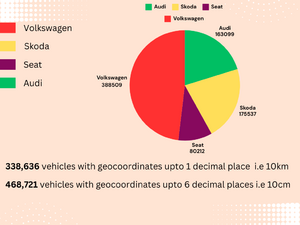Please note that all submissions to the site are subject to the wiki's licence, CC 4.0 BY-SA, as found here
Volkswagen Car Location Data Exposure Incident
In 2024, Volkswagen experienced a data security incident involving customer vehicle information stored on Amazon Web Services (AWS). The incident occurred when Volkswagen's implementation of CARIAD, a system used for storing terabytes of customer data, was discovered to have publicly accessible storage instances due to a misconfiguration[1].
Background[edit | edit source]
This incident occurred within a broader context of automotive data security concerns. Modern vehicles increasingly collect and transmit various types of data, including location information, driving patterns, and user identification[2]. The automotive industry has previously faced scrutiny regarding data collection practices, with documented instances of manufacturers collecting and sharing vehicle data with third parties.
The Incident[edit | edit source]

The core issue stemmed from a misconfiguration in Volkswagen's AWS storage implementation, which left customer data publicly accessible without proper authentication or access restrictions[1]. This exposed sensitive information about vehicle locations, EV battery statistics and sensitive customer information. The incident not only breaches customer trust, but Volkswagen's own Terms of Service.
Industry Context[edit | edit source]
The incident highlighted ongoing discussions about automotive data security and privacy. Similar concerns were raised during the 2020 Massachusetts Right to Repair ballot initiative, where major automotive manufacturers including General Motors, Ford, Nissan, Toyota, and Honda invested approximately $25 million in campaign advertising discussing data security implications.
Regulatory Response[edit | edit source]
The National Highway Traffic Safety Administration (NHTSA) has previously expressed concerns about automotive data security. Following the 2020 Massachusetts Right to Repair initiative, NHTSA official Carrie Gules issued a letter addressing potential security vulnerabilities in vehicle data systems [citation needed ].
Broader Implications[edit | edit source]
This incident demonstrates the broader challenges facing the automotive industry regarding data security and privacy. It has been documented that automotive manufacturers regularly collect various types of vehicle data[2], including:
- Location information
- Driving patterns
- Vehicle operation metrics
- User behavior data
Some manufacturers have established partnerships with data aggregators and insurance companies for data-sharing purposes. For example, General Motors has been documented to share driving data with LexisNexis and insurance companies, including information about:
- Vehicle location data
- Turning radius information
- Stop times
- Drive times
See Also[edit | edit source]
- Automotive data privacy
- Right to Repair movement
- Vehicle telematics
- Connected car security
- CARIAD
- Volkswagen Group
- 2020 Massachusetts Right to Repair ballot initiative
- General Motors Data Theft
References[edit | edit source]
- ↑ 1.0 1.1 [1]"Volkswagen Data Breach: 800,000 Electric Car Owners’ Data Leaked" written by Guru Baran (co-founder of Cyber Security News and GBHackers On Security). Archived from the original on December 28, 2024. Retrieved on January 15, 2025.
- ↑ 2.0 2.1 [2]"Cars & Consumer Data: On Unlawful Collection & Use" written in collaboration by the Office of Technology and the Division of Privacy and Identity Protection in the Bureau of Consumer Protection. Archived from the original on May 14, 2024. Retrieved January 15, 2025.
Note: This article represents an ongoing situation and may be updated as more information becomes available.
3. For the link to the news source which was tipped off by a German hacktivist group. Archived from the original on December 27, 2024. Retrieved January 15, 2025.
4. Youtube video with mentioned credits for more information.